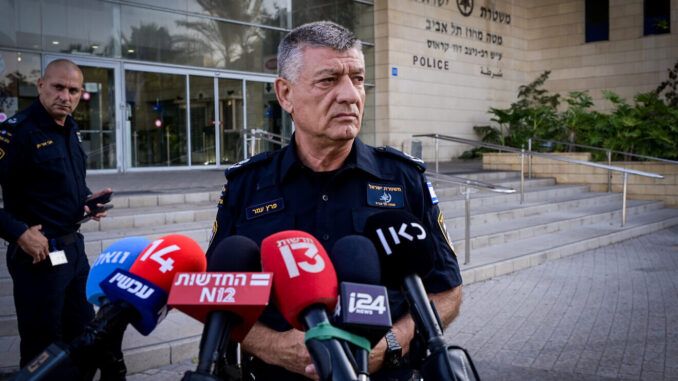Why travel to Tel Aviv, risking capture along the way?
Moshe Phillips | August 23, 2024
 Tel Aviv District Commander Peretz Amar following a failed bombing attack, in Tel Aviv, Aug. 19, 2024. Photo by Avshalom Sassoni/Flash90
Tel Aviv District Commander Peretz Amar following a failed bombing attack, in Tel Aviv, Aug. 19, 2024. Photo by Avshalom Sassoni/Flash90
The fumbled suicide bombing in Tel Aviv might sound as if it was just another one of the countless attempted terrorist attacks that fail for whatever reason and are ignored by the international community. But if you look closer, you see that there’s much to be learned from this incident.
Let’s start with the fact that the bomber, Jafar Muna, was a resident of Nablus (Shechem, in Hebrew), a city governed by the Palestinian Authority. Why did he travel all the way to Tel Aviv, 26 miles away, to carry out the attack?
After all, if Nablus and other Palestinian Arab cities are “occupied”—as the media and Peace Now constantly claim—why didn’t he attack the “occupiers” right there? Why travel to Tel Aviv, risking capture along the way?
Because there aren’t any Israelis in Nablus, aside from a handful of Israeli soldiers guarding an ancient Jewish religious site, the Tomb of Joseph. Despite what Israel’s enemies claim, there is no “Israeli occupation” of Nablus. The Israeli governor, and the Israeli military administration, left back in 1995, as a result of the Oslo II Accord.
If they were still “occupying” the city, Jafar Muna could have targeted them. The fact that Muna had to leave Nablus to find a target proves that the “occupation” claim is a lie. Killing a few Israelis at the Tomb of Joseph would not have satisfied him. He wanted to kill a lot of Jews. So he set his sights on Tel Aviv.
Tel Aviv is, of course, within Israel’s pre-1967 armistice lines. It’s not a “settlement.” It’s not “occupying” anything or anybody. But there are lots of Jews there—that is, Jewish targets.
The second lesson from the Tel Aviv bombing has to do with the response of the bomber’s family.
“My love, my brother, we are proud of you, thanks be to Allah,” his sister, Nahla Muna, declared. “We consider you one of the martyrs before Allah, and we praise him before Allah. We only say what pleases Allah: to Allah we belong, and to Allah we return.”
That’s not all. She continued: “We will meet in paradise. You preceded us to Father, may Allah have mercy on him, may Allah have mercy on you and accept you, praise be to Allah. Martyr, blessed be Allah.”
In a normal, civilized society, a person is ashamed if one of their close family members commits a heinous crime. Attempted mass murder is considered a bad thing. A sibling of the would-be killer either condemns her brother’s action or at least has the decency to remain silent.
But not in Palestinian Arab society. Nahla Muna wrote the above praise of her brother-the-bomber on her Facebook page. She was so proud of his attempt to massacre Jews that she was willing to risk arrest by the Israelis in order to proclaim her support for his vile deed.
Notice, too, that Nahla wasn’t concerned that her friends or neighbors in Nablus might ostracize her when they saw her pro-terrorism comments on Facebook. Nahla knows that they, too, support murdering Jews. Her employer won’t fire her. Her neighbors won’t shun her. And the Palestinian Authority won’t arrest her for incitement.
Which brings us to the third—and most important lesson—from the attack in Tel Aviv: the response of the Palestinian Authority. Or, more accurately, the non-response.
The Oslo Accords obligate the P.A. to condemn terrorist attacks. It did not say a word about the Tel Aviv bombing. Why? Because the P.A. didn’t disapprove of it. More than that: The Palestinian Authority supports slaughtering Jews. Jafar Muna is now regarded as an official “martyr” by the P.A., meaning that his family qualifies for a monthly payment for the rest of their lives.
The Oslo agreement also requires the P.A. to stop teaching “hatred and incitement” in its schools. Instead, for the past 30 years, Palestinian Arab schoolchildren have been taught that Jews are evil, that terrorists are heroes, and that all of Israel is “occupied Palestine” and must be destroyed.
Jafar Muna is proof of that. He was the product of the P.A.’s educational system. He was taught by P.A. teachers and studied P.A. textbooks. He absorbed their messages of antisemitic hatred. And he acted upon them.
Muna’s bomb detonated before he intended. But how many more Jafar Munas are out there? Plenty. Because the “moderate,” “peace-seeking” P.A. has raised an entire generation of them—and the world has stood by silently as it did so.
Moshe Phillips is national chairman of Americans For A Safe Israel (AFSI), a leading pro-Israel advocacy and education organization.



I agree with the sentiment of making both sudes uphold the signed agreements. For some reason, the world thinks that minor infringements are OK, although every single missile, balloon with IED or whatever they try to do is attempted murder. Only the continued prudence in guarding against these heinous acts keeps the number of casualties so low. It’s far time to make the punishment fit the crime.
A kind of “de-propagandizing” of those captured. Interesting…
The first thing Israel should do with all Palestinians captured in war, is radically lobotomise them, rendering them drooling cabbages. Thus they are rendered valueless in hostage negotiation. And then immedately return them to the “Occupied territories” with suicide vests, for Allah to figure out what to do with.
Kind of their own Walking Dead.
Taking the moral higher ground has not worked. Time to get down and dirty. Turning their own people into massive liabilities.
You didn’t include the most obvious lesson of all: that Israel from the get-go should never have allowed the PA to get away with violating those Oslo Accords.